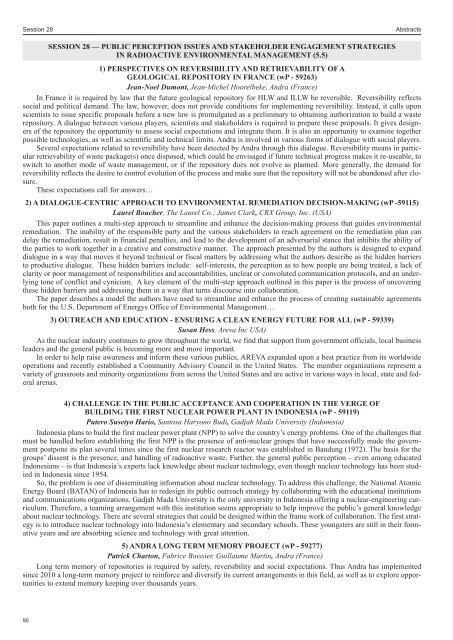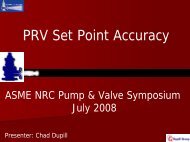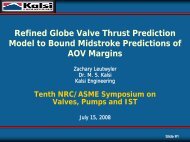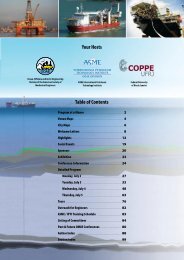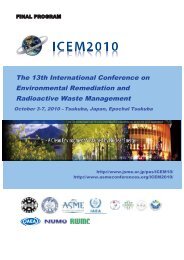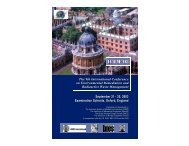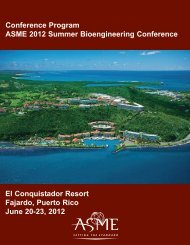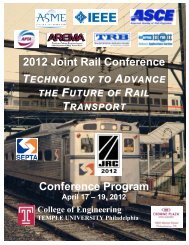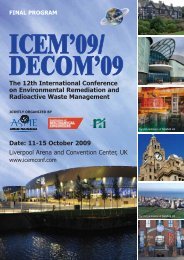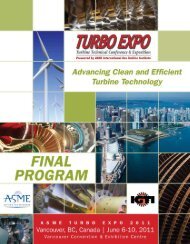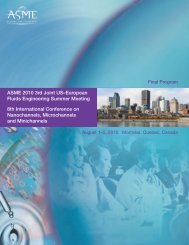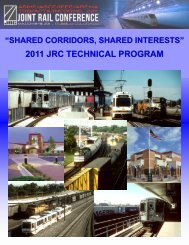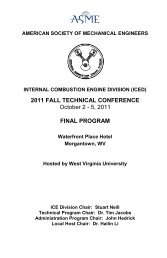ICEM11 Final Program 9.7.11pm_ICEM07 Final Program ... - Events
ICEM11 Final Program 9.7.11pm_ICEM07 Final Program ... - Events
ICEM11 Final Program 9.7.11pm_ICEM07 Final Program ... - Events
Create successful ePaper yourself
Turn your PDF publications into a flip-book with our unique Google optimized e-Paper software.
Session 28 Abstracts<br />
SESSION 28 — PUBLIC PERCEPTION ISSUES AND STAKEHOLDER ENGAGEMENT STRATEGIES<br />
IN RADIOACTIVE ENVIRONMENTAL MANAGEMENT (5.5)<br />
1) PERSPECTIVES ON REVERSIBILITY AND RETRIEVABILITY OF A<br />
GEOLOGICAL REPOSITORY IN FRANCE (wP - 59263)<br />
Jean-Noel Dumont, Jean-Michel Hoorelbeke, Andra (France)<br />
In France it is required by law that the future geological repository for HLW and ILLW be reversible. Reversibility reflects<br />
social and political demand. The law, however, does not provide conditions for implementing reversibility. Instead, it calls upon<br />
scientists to issue specific proposals before a new law is promulgated as a preliminary to obtaining authorization to build a waste<br />
repository. A dialogue between various players, scientists and stakeholders is required to prepare these proposals. It gives designers<br />
of the repository the opportunity to assess social expectations and integrate them. It is also an opportunity to examine together<br />
possible technologies, as well as scientific and technical limits. Andra is involved in various forms of dialogue with social players.<br />
Several expectations related to reversibility have been detected by Andra through this dialogue. Reversibility means in particular<br />
retrievability of waste package(s) once disposed, which could be envisaged if future technical progress makes it re-useable, to<br />
switch to another mode of waste management, or if the repository does not evolve as planned. More generally, the demand for<br />
reversibility reflects the desire to control evolution of the process and make sure that the repository will not be abandoned after closure.<br />
These expectations call for answers…<br />
2) A DIALOGUE-CENTRIC APPROACH TO ENVIRONMENTAL REMEDIATION DECISION-MAKING (wP -59115)<br />
Laurel Boucher, The Laurel Co.; James Clark, CRX Group, Inc. (USA)<br />
This paper outlines a multi-step approach to streamline and enhance the decision-making process that guides environmental<br />
remediation. The inability of the responsible party and the various stakeholders to reach agreement on the remediation plan can<br />
delay the remediation, result in financial penalties, and lead to the development of an adversarial stance that inhibits the ability of<br />
the parties to work together in a creative and constructive manner. The approach presented by the authors is designed to expand<br />
dialogue in a way that moves it beyond technical or fiscal matters by addressing what the authors describe as the hidden barriers<br />
to productive dialogue. These hidden barriers include: self-interests, the perception as to how people are being treated, a lack of<br />
clarity or poor management of responsibilities and accountabilities, unclear or convoluted communication protocols, and an underlying<br />
tone of conflict and cynicism. A key element of the multi-step approach outlined in this paper is the process of uncovering<br />
these hidden barriers and addressing them in a way that turns discourse into collaboration.<br />
The paper describes a model the authors have used to streamline and enhance the process of creating sustainable agreements<br />
both for the U.S. Department of Energys Office of Environmental Management…<br />
3) OUTREACH AND EDUCATION - ENSURING A CLEAN ENERGY FUTURE FOR ALL (wP - 59339)<br />
Susan Hess, Areva Inc USA)<br />
As the nuclear industry continues to grow throughout the world, we find that support from government officials, local business<br />
leaders and the general public is becoming more and more important.<br />
In order to help raise awareness and inform these various publics, AREVA expanded upon a best practice from its worldwide<br />
operations and recently established a Community Advisory Council in the United States. The member organizations represent a<br />
variety of grassroots and minority organizations from across the United States and are active in various ways in local, state and federal<br />
arenas.<br />
4) CHALLENGE IN THE PUBLIC ACCEPTANCE AND COOPERATION IN THE VERGE OF<br />
BUILDING THE FIRST NUCLEAR POWER PLANT IN INDONESIA (wP - 59119)<br />
Putero Susetyo Hario, Santosa Haryono Budi, Gadjah Mada University (Indonesia)<br />
Indonesia plans to build the first nuclear power plant (NPP) to solve the country’s energy problems. One of the challenges that<br />
must be handled before establishing the first NPP is the presence of anti-nuclear groups that have successfully made the government<br />
postpone its plan several times since the first nuclear research reactor was established in Bandung (1972). The basis for the<br />
groups’ dissent is the presence, and handling of radioactive waste. Further, the general public perception – even among educated<br />
Indonesians – is that Indonesia’s experts lack knowledge about nuclear technology, even though nuclear technology has been studied<br />
in Indonesia since 1954.<br />
So, the problem is one of disseminating information about nuclear technology. To address this challenge, the National Atomic<br />
Energy Board (BATAN) of Indonesia has to redesign its public outreach strategy by collaborating with the educational institutions<br />
and communications organizations. Gadjah Mada University is the only university in Indonesia offering a nuclear-engineering curriculum.<br />
Therefore, a teaming arrangement with this institution seems appropriate to help improve the public’s general knowledge<br />
about nuclear technology. There are several strategies that could be designed within the frame work of collaboration. The first strategy<br />
is to introduce nuclear technology into Indonesia’s elementary and secondary schools. These youngsters are still in their formative<br />
years and are absorbing science and technology with great attention.<br />
5) ANDRA LONG TERM MEMORY PROJECT (wP - 59277)<br />
Patrick Charton, Fabrice Boissier, Guillaume Martin, Andra (France)<br />
Long term memory of repositories is required by safety, reversibility and social expectations. Thus Andra has implemented<br />
since 2010 a long-term memory project to reinforce and diversify its current arrangements in this field, as well as to explore opportunities<br />
to extend memory keeping over thousands years.<br />
90


